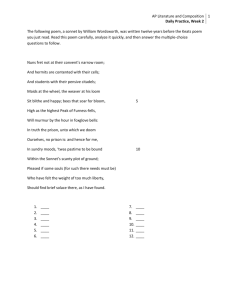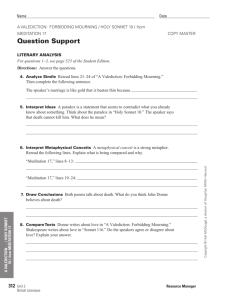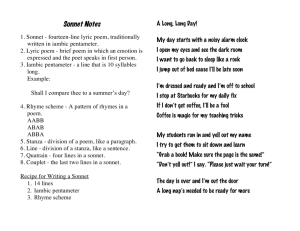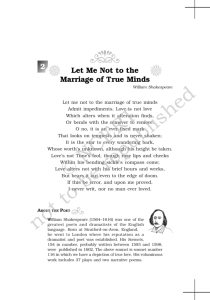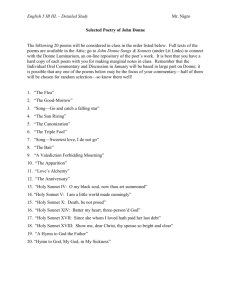study guide for 17 th century poetry test #2—key
advertisement
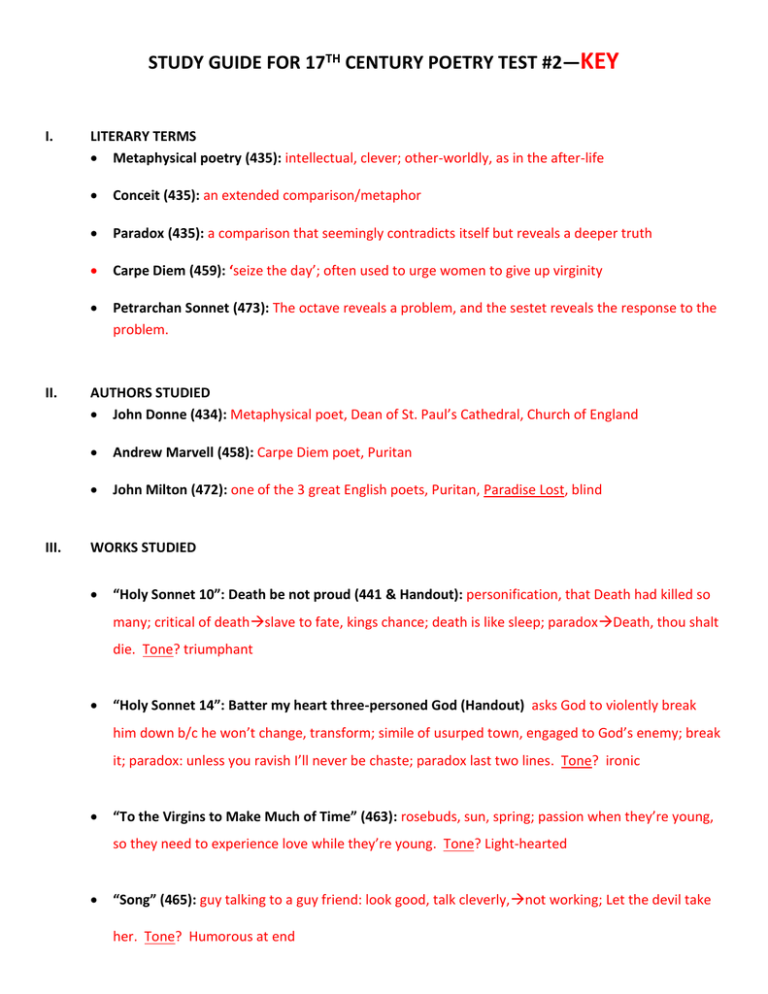
STUDY GUIDE FOR 17TH CENTURY POETRY TEST #2—KEY I. II. III. LITERARY TERMS Metaphysical poetry (435): intellectual, clever; other-worldly, as in the after-life Conceit (435): an extended comparison/metaphor Paradox (435): a comparison that seemingly contradicts itself but reveals a deeper truth Carpe Diem (459): ‘seize the day’; often used to urge women to give up virginity Petrarchan Sonnet (473): The octave reveals a problem, and the sestet reveals the response to the problem. AUTHORS STUDIED John Donne (434): Metaphysical poet, Dean of St. Paul’s Cathedral, Church of England Andrew Marvell (458): Carpe Diem poet, Puritan John Milton (472): one of the 3 great English poets, Puritan, Paradise Lost, blind WORKS STUDIED “Holy Sonnet 10”: Death be not proud (441 & Handout): personification, that Death had killed so many; critical of deathslave to fate, kings chance; death is like sleep; paradoxDeath, thou shalt die. Tone? triumphant “Holy Sonnet 14”: Batter my heart three-personed God (Handout) asks God to violently break him down b/c he won’t change, transform; simile of usurped town, engaged to God’s enemy; break it; paradox: unless you ravish I’ll never be chaste; paradox last two lines. Tone? ironic “To the Virgins to Make Much of Time” (463): rosebuds, sun, spring; passion when they’re young, so they need to experience love while they’re young. Tone? Light-hearted “Song” (465): guy talking to a guy friend: look good, talk cleverly,not working; Let the devil take her. Tone? Humorous at end “To His Coy Mistress” (461-462 & Handout): If we had endless time and space, I could devote ages of time to romance you, but we don’t. We will age and die and end up in tombs with worms, and how honorable will your virginity be then in the dust? Let us be like amorous birds of play and sport while we are young. Our love will be so strong, we’ll make time slow down. o Famous Quote: “and at my back Time’s winged chariot flies” Tone? threatening “Sonnet VII/7”: How soon hath Time” (475): Time flies like a bird. I’m 23 already even though I don’t look fully mature. But on the inside, I am ripe, fully mature. I am ready to fulfill all the tasks of a man and a servant to God, the great Taskmaster. Tone? determined “Sonnet XIX/19” When I consider how my light is spent”: I’ve spent my life doing God’s work: writing poetry and pamphlets to the glory of his name, but now I’m blind, and it’s hard for me to do my work. Does God expect me to write in his name if I can no longer see? Personified Patience answers me: God expects all to bear whatever mild yoke is sent to them without complaint. Tone? Instructional, accepting IV. SHORT ESSAY QUESTION: In what ways can John Donne’s poem, “Holy Sonnet 14: Batter my heart” be considered to be metaphysical? Topic Sentence: There are a number of ways that John Donne’s poem, “Holy Sonnet 14,” can be considered metaphysical. Definition Sentence: Metaphysical poetry is characterized by its intellectual wit and focus on otherworldly topics. Example & Explanation #1: One way the sonnet is intellectually clever is through the use of the conceit of the speaker as a “usurped town.” Medieval towns had huge gates that had to be battered repeatedly in order to bring down. The opening line of the poem begins with a command for God to batter his heart, as if the heart is the gate of the town, Transition + Example & Explanation #2: In addition, the poem is clever in its use of paradox in the closing line of the poem: “Except thou ravish me, I’ll never be chaste.” The word ravish has both sexual and violent connotation, and the word chaste refers to sexual purity. On the surface, these two words seem to have nothing to do with each other; however, the speaker doesn’t believe he will make the right choice to live a good life unless God does violently remind him to give up his sinful ways. Transition + Example & Explanation #3: Furthermore, this metaphysical poem contains an otherworldly focus on God and the after-life. The speaker says that he is engaged to God’s enemy, the devil, and depends upon God to save him, no matter how much violence is needed. Conclusion Sentence: Through the use of conceit, paradox, and a focus on God, “Holy Sonnet 14” reveals itself to be a metaphysical poem. PLANNING EVIDENCE “HOLY SONNET 10”: DEATH BE NOT PROUD “HOLY SONNET 14”: BATTER MY HEART Intellectual wit: conceitsimile of usurped town with a gate that needs to be battered. Intellectual wit: paradoxwill not be chaste unless thou ravish me. Other-worldly: focus on God; break engagement to the devil
